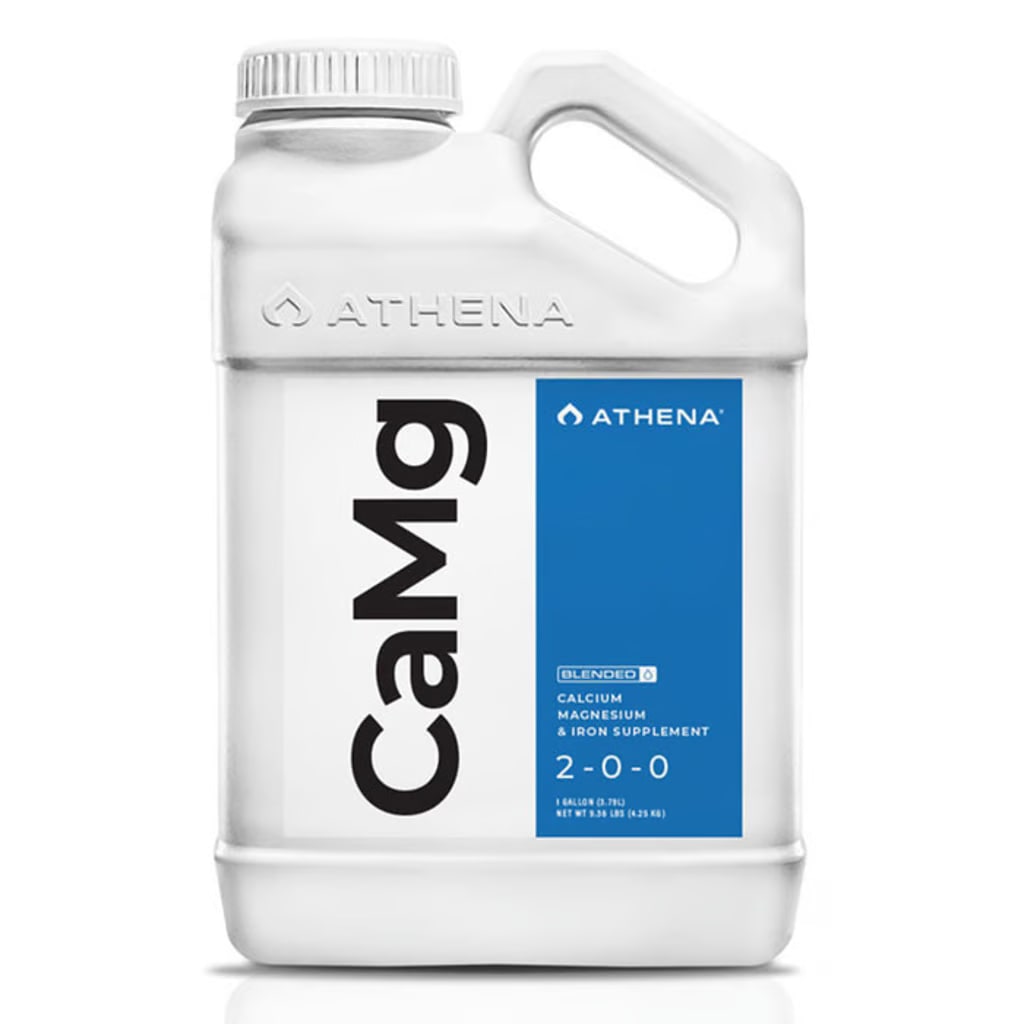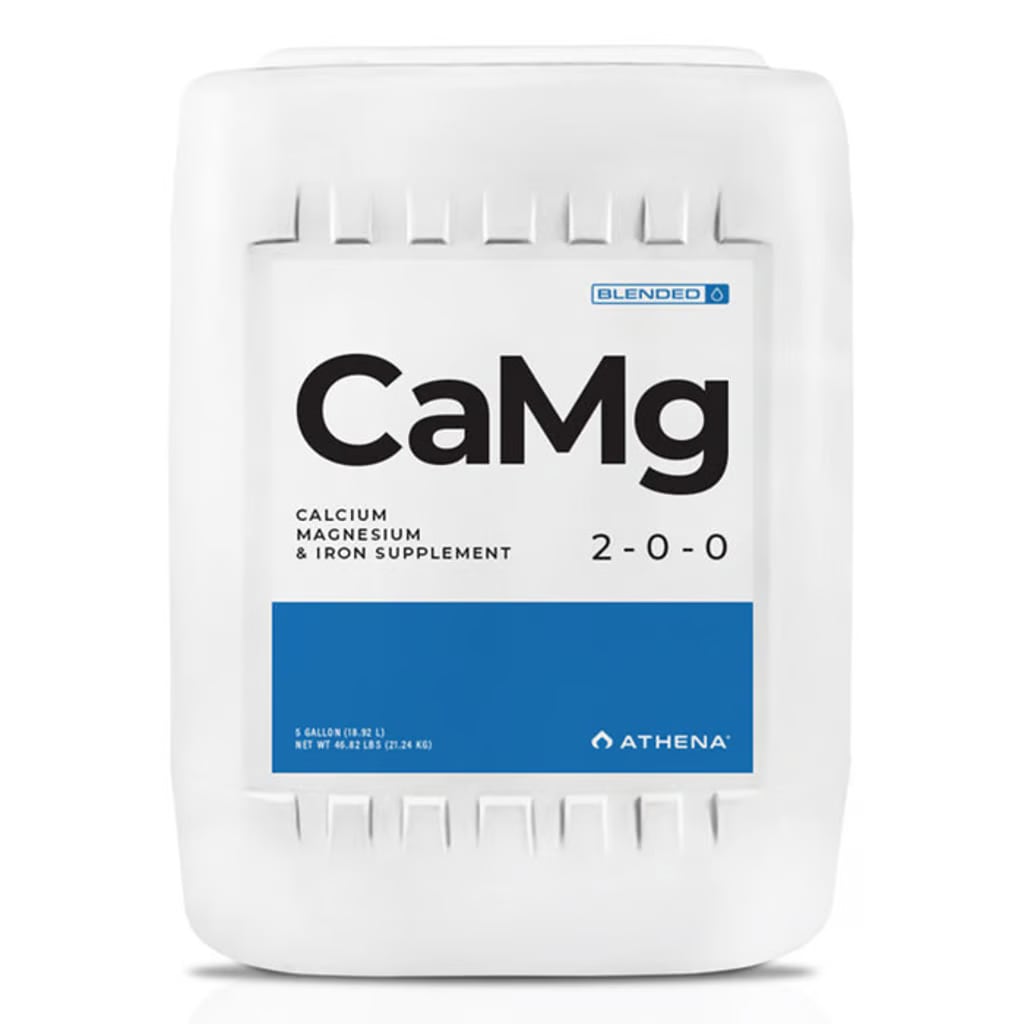Athena
Athena Blended CaMg 2-0-0
Athena Blended CaMg 2-0-0
41 in stock
Couldn't load pickup availability
Payment options
- Fast Delivery
- Easy Returns
- Secure Checkout
Description
Description
Athena CaMg is a specialized nutrient supplement designed to address one of the most common challenges in plant cultivation: calcium and magnesium deficiency. This balanced formula provides plants with essential calcium and magnesium, ensuring they have the necessary building blocks for healthy growth and development. Whether you're growing crops in soil, hydroponic systems, or other mediums, Athena CaMg can help prevent and correct deficiencies, leading to vibrant and vigorous plants.
Key Features:
Calcium and Magnesium Support: Athena CaMg is specifically formulated to provide plants with optimal levels of calcium and magnesium. These two minerals are crucial for various physiological processes, including cell structure, photosynthesis, and nutrient uptake.
Deficiency Prevention: Calcium and magnesium deficiencies can manifest as symptoms like yellowing leaves and poor fruit development. Athena CaMg helps prevent these issues, ensuring your plants have the right nutrients to thrive.
Balanced Nutrient Ratios: This formula maintains a carefully balanced ratio of calcium to magnesium, which is essential for preventing imbalances that could inhibit nutrient absorption.
Improved Nutrient Uptake: By providing the necessary calcium and magnesium, Athena CaMg ensures that plants can efficiently take up other essential nutrients from the root zone.
Versatile Application: Suitable for use in various cultivation methods, including soil, hydroponics, coco coir, and soilless mixes.
Customizable Dosage: Users can tailor the supplement's dosage to match the specific needs of their plants and growing conditions, making it suitable for a wide range of crops.
Usage Instructions:
Dilution: Mix Athena CaMg with water according to the recommended dilution ratios provided on the product label. Ensure thorough mixing for a consistent nutrient solution.
Application: Add the nutrient solution to your regular feeding regimen. Athena CaMg can be used throughout the plant's life cycle, but it's particularly beneficial during periods when calcium and magnesium deficiencies are more likely to occur.
Monitoring: Keep an eye on your plants for signs of improved overall health, including lush green foliage and vigorous growth. Adjust the dosage if you observe persistent nutrient deficiency symptoms.
Consistent Usage: Incorporate Athena CaMg as part of your regular feeding routine to maintain healthy calcium and magnesium levels in your plants.
Athena CaMg is an essential addition to any grower's toolbox, as it addresses a common issue that can affect the growth and development of a wide range of crops. By ensuring plants receive adequate calcium and magnesium, you can prevent nutrient deficiencies, promote robust growth, and ultimately achieve healthier, more productive plants. Whether you're cultivating vegetables, ornamental plants, or anything in between, Athena CaMg helps you provide the foundation for success in your garden.
Best Practices
Shake well before use.
Use clean measuring instruments--do not put anything into the bottle.
Some applications may require different dosages.
Recommended for hydroponic use, especially with inert media and when using reverse osmosis (RO) water.
Monitor EC regularly and adjust accordingly based on crop and growth stage.
Adjust to pH to proper levels after mixing all fertilizers and additives.
Store closed in original packaging at a temperature between 45° F and 85° F.
Share


INFORMATION QUESTIONS
FREQUENTLY ASKED QUESTIONS
What is Hydroponics?
Hydroponics is the science of growing plants without soil. The plants thrive on the nutrient-water solution alone. The growing medium merely acts as a support for the plants and their root systems while the solution passes freely. The growing medium, if any, is totally inert.
What types of plants grow best hydroponically?
Anything can be grown hydroponically, but some plants prove to be more space efficient. Some plants we suggest are tomatoes, sweet peppers, hot chilies, lettuce, spinach, squash, cucumbers, broccoli, beans, snow peas, herbs and flowers of all types.
Can you REALLY get better yields/quicker growth?
Absolutely. The plants, when receiving everything they need, tend to be healthier, faster growing and generally more productive. You can expect 30% faster growth with many crops.
What are the watering cycle timelines hydroponic systems?
Once the reservoir is filled with nutrients, it is time to put your hydro system to work! The ease of hydroponics is automation – automation is achieved by putting the pump on a timer according to your watering needs. The watering cycle depends on growth stage, growing medium and hydroponic system. In an ebb and flow or drip system with rockwool as the medium, seedlings, clones and plants in the early vegetative stage require watering only once a day for 15-30 minutes (twice a day for higher temps). Mature, flowering and fruiting plants require a heavier feed and can be fed once a day for 30 minutes (twice a day for higher temps). Typically soiless mixes and coco fiber can be watered for about 15 minutes twice a day, and can be adjusted for heavier feeding during the flowering and fruiting stage or higher temps. ViaStone, Hydroton, Grow Rocks, and Silicate mediums need to be watered more frequently – a constant drip for drip systems, and about 15-30 minutes every 3 hours for ebb and flow systems and can be adjusted for heavier feeding during the flowering and fruiting stage or higher temps. Aeroponic systems require frequent watering cycles; 30-60 seconds every few minutes or a constant spray.
What do I need to test pH? How do I test pH?
pH has a range from 0 (acidic) – 14 (alkaline), with 7 being neutral. A proper hydroponic pH range is between 5.5 to 6.2 for most hydroponic crops. For specific crop pH, check out our Plant Guide. pH must remain within the proper range for good plant health, disease resistance, and proper nutrient uptake. pH is maintained by adding pH Up and pH Down to the nutrient solution. For more information, see the Testssection of our site.
How will the flavor compare to my outdoor grown, organic produce?
The taste may be even better! This is simply due to the fact that the hydroponically grown plants are getting everything they need, when they need it. Don’t be fooled by “hot house” produce grown commercially. The grower’s primary concern is shipability and storage, not flavor. When you grow your own vegetables at home, you can expect nothing less than excellent results. Plus, hydroponically grown produce has the added benefit of a longer shelf life.

